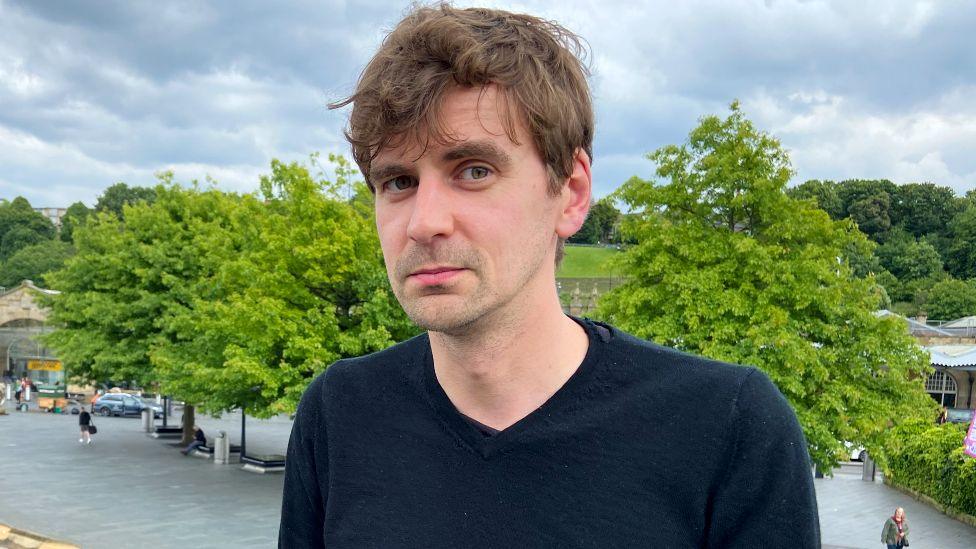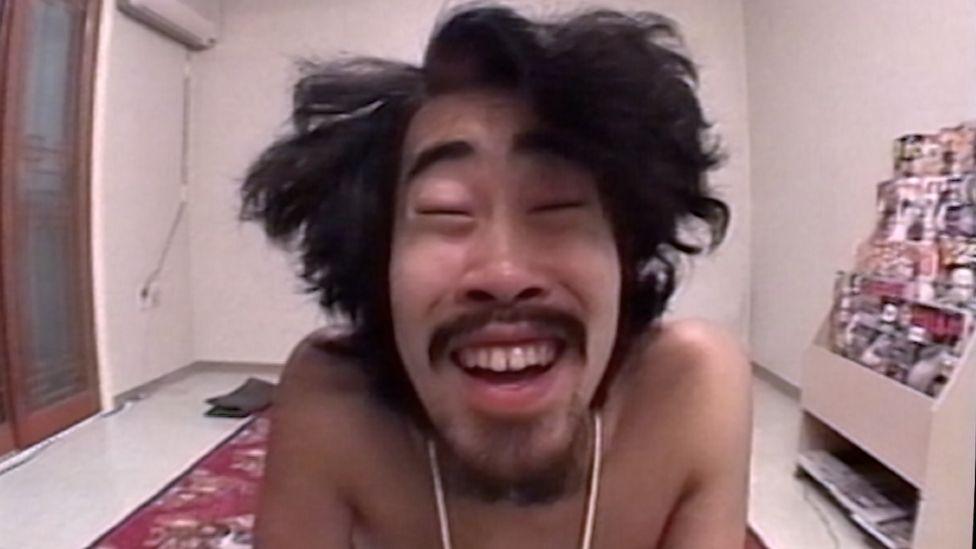Prison dance has 'profound' impact on dads and daughters
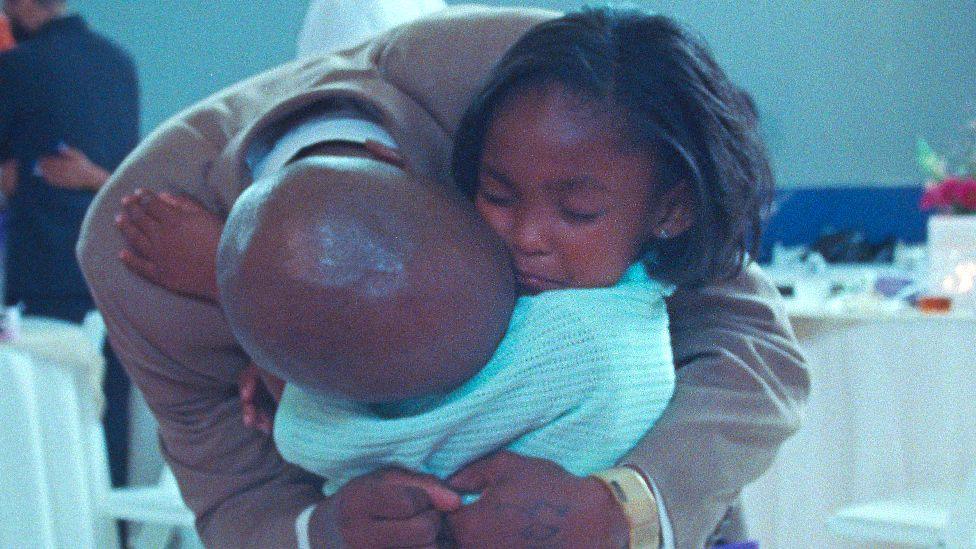
Director Natalie Rae says the daddy-daughter dance has a "profound" impact on both sides
- Published
A new documentary follows a group of inmates in a US prison - and a rare opportunity for them to bond with the children they rarely get to see.
The men who are filmed for Daughters, which has just screened at the Sheffield Documentary Festival, are serving sentences of several years, if not decades, in Washington DC.
Viewers aren't told why the men are in jail - their crimes are not the point. Instead, the film is built around a forthcoming father-daughter dance, an event which involves lunch, dancing and other activities, and takes place in the repurposed prison gymnasium.
The documentary shines a light on the importance of in-person visits, and the crucial role fathers can play as their daughters progress into womanhood.
The daddy-daughter dance, as it's known, was spearheaded by Virginia-based community activist Angela Patton, who co-directs the film with Natalie Rae.
"The dance is this really special few hours where you have the opportunity to form a deep connection, look each other in the eye, hug, dance, share a very profound memory, and be able to say 'I love you' or 'I would love to have a relationship'," Rae tells BBC News in Sheffield.
"This one day is profound because it's so rare in this context, it's galvanised as this incredible memory - it's like a prom or a wedding, it's so special, something you can call upon if you're having a hard time."
Rae has directed music videos and shorts before, but Daughters is her first feature-length film. She says the dance is so impactful for both parties because "you don't have to go through all these other filters and barriers that are usually there".
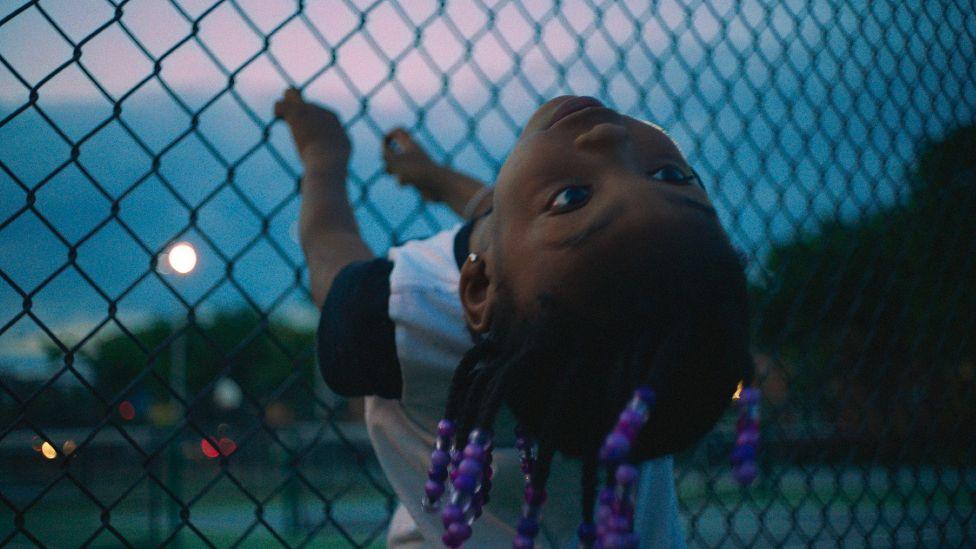
The film follows several of the girls over several years as they grow up and try to build a relationship with their fathers
The unusual event at the centre of the film sees the fathers and daughters bond through dancing, laughter and conversation.
"It was an opportunity for us to elevate girls' voices, to show black experiences and black girls in a different light," Patton says of the film.
"A lot of people try to protect children from every emotion except for happiness, and that's not the reality of life.
"We have to be OK with being angry and upset about things, but then ask: 'What are we going to do to cope with that? How are we going to combat that, where are the resources?'"
Patton organised the original daddy-daughter dance nearly two decades ago, as part of the work she did running organisations which support young black girls as they grow into womanhood.
An advocate for the importance of the father-daughter relationship, Patton had asked some of the girls she worked with in Virginia what would help them feel more connected to their fathers.
When one girl suggested a dance, there was swift agreement and enthusiasm from her peers. Patton quickly set to work organising the event, and the dance was a huge success in its first year, 2007.
'These men are human beings'
In subsequent years, however, some of the girls expressed sadness that their own fathers could not participate because they were in jail. That prompted Patton to encourage the girls to contact the local prison to ask about hosting the dance there.
"A letter was written to the Richmond County Sheriff, signed collectively by each girl," Patton recalled in her 2012 Ted Talk., external "And I would have to say, he is a very special sheriff.
"He contacted me immediately, and said whenever there is an opportunity to bring families inside, his doors are always open, because one thing he did know was when fathers are connected to their children, it is less likely that they will return [to prison]."
The first prison-based event was a triumph, prompting Patton to organise several more over the following years. She estimates there have been 12 or 13 since, adding that prisons in other parts of the US have also adopted the idea independently.
She explains her drive to highlight the importance of the father-daughter relationship comes from her own childhood.
"I'm a black woman who has been fortunate to have my father in my life," she says, "and I know friends and peers of mine who did or did not, I'm able to see their experiences as they've grown into womanhood and where they have challenges.
"Not only with men but with overall decisions, beating themselves up often, fearing neglect, and having conversations with me because of my role around what they feel like they need and they're missing."
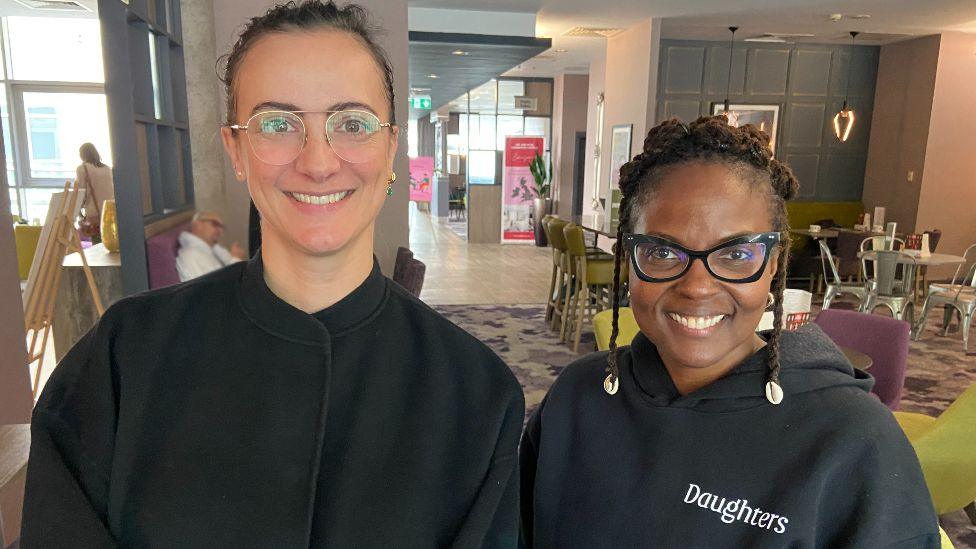
Natalie Rae (left) co-directs the film with Virginia community activist Angela Patton
Patton's Ted Talk came to the attention of Rae, who says she knew instinctively it would make excellent material for a documentary.
"The parent-child relationship is just so important for connection, healing and the human experience," the director says.
On a practical level, she admits getting the cameras in prisons to film was "a really hard thing to do, but because Angela is a community leader and had done previous dances for over 10 years, there was definitely a strong track record".
But the dance itself is only part of the story. The event is preceded by a 10-week educational programme which features group therapy and practical advice about responsible fatherhood.
Many of the men, initially, are reluctant to share their feelings. But they gradually warm up as the sessions progress.
Several have legitimate worries about how long it's been since they last saw their daughters, most of whom are still very young. Will they even recognise their fathers? And if so, will they be able to connect? There are similar concerns from the daughters themselves.
However, the moment the girls arrive for the dance and walk down the prison corridor, nervously trying to spot their fathers, is the highlight of the film.
The men are lined up, dressed in suits for the occasion. The reunions are initially awkward in some cases, but also joyful and tender.
"This quietly consequential film makes clear the weight of mass incarceration on families," wrote Variety's Lisa Kennedy, external after the film debuted at Sundance.
"In introducing the girls from youngest to oldest, Daughters makes the gentle point that as the girls age, a father’s absence can create greater uncertainty and unease in the world."
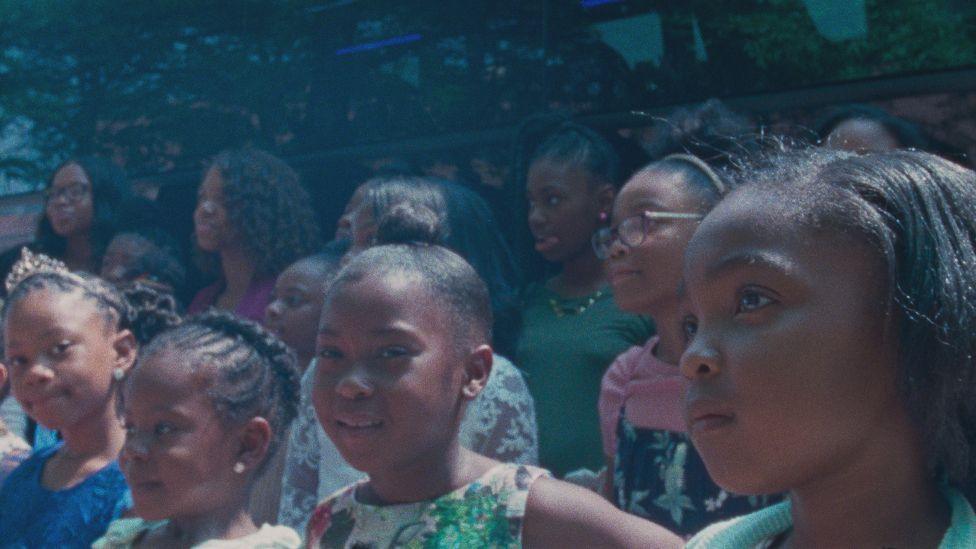
Critics have described the film as "quietly consequential"
It is unusual for an activist who created the central project to have a co-director role in the film.
“I think there are conversations to be had about the filmmaking ethics of Patton’s undiscussed capacity as both co-director and onscreen catalyst," noted the Hollywood Reporter's Daniel Fienberg, external, "but there’s little doubt that her presence contributed to the openness of the four girls who serve as the primary protagonists.”
But Patton says it "was just another platform for me to tell a story", adding that making a film felt like a natural progression from writing books, delivering Ted Talks and doing community work.
Rae jokes that the film benefits from having "a 200% director", adding: "I just thought the film would be better going through the filter of each of us."
"And of course there are gaps in my experience, and that's obviously very important to the story."
The film does not suggest the men should not be in prison. Instead, its central message is the importance of the father-daughter relationship, and how it should be maintained while the men are in prison.
Director Rae reflects: "Being from the girls' perspective, and with the girls being innocent of any crime, all these girls deserve love and access to a parent who can communicate with them. So what the fathers did is really beside the point.
"And I also believe these men are human beings who deserve love and relationships with their children. So we left [their crimes] out of the film completely."
Instead, the film highlights that limitations on in-person visits and the prohibitive costs of phone or video calls prevent the amount of contact both sides would like.
Many US prisons today use apps, demonstrated in the film, which show pricing tiers where family members can purchase different levels of access to the inmates.
"We believe kids' rights to their parents should be protected, and touch visits should be a human right," Rae says, "and the prison system shouldn't be profiting on family separation by allowing tech companies to come in and sell these apps."
Patton hopes for more dances in the future. "Because it was done once, and everybody came out without any bumps and bruises, then obviously it can be replicated."
She is delighted that other prisons have since adopted the idea without her involvement.
"I don't want to do all the work!" she laughs. "Some people said 'Oh they copied you', and I'm like, 'that's what I'm excited about!' When you're a community activist, you don't own anything."
- Published16 June 2024
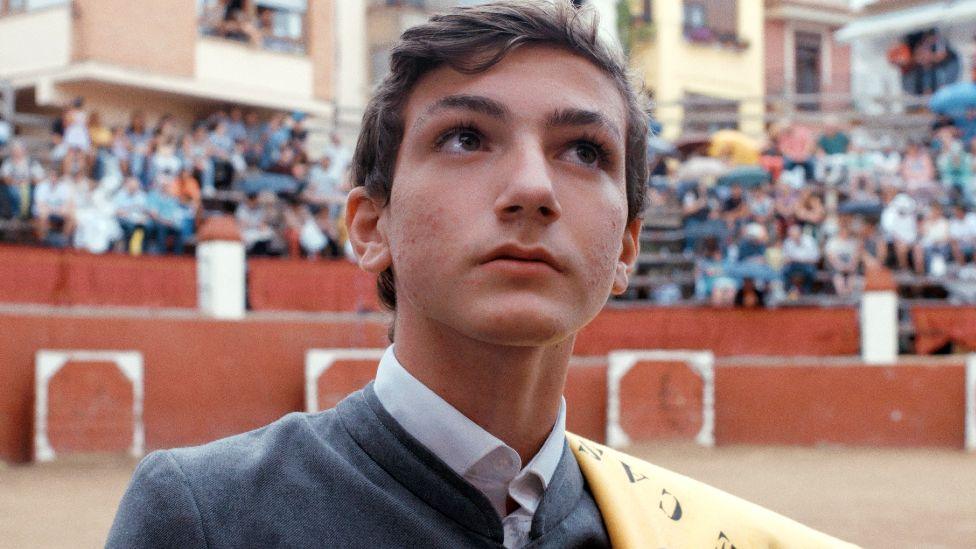
- Published17 June 2024
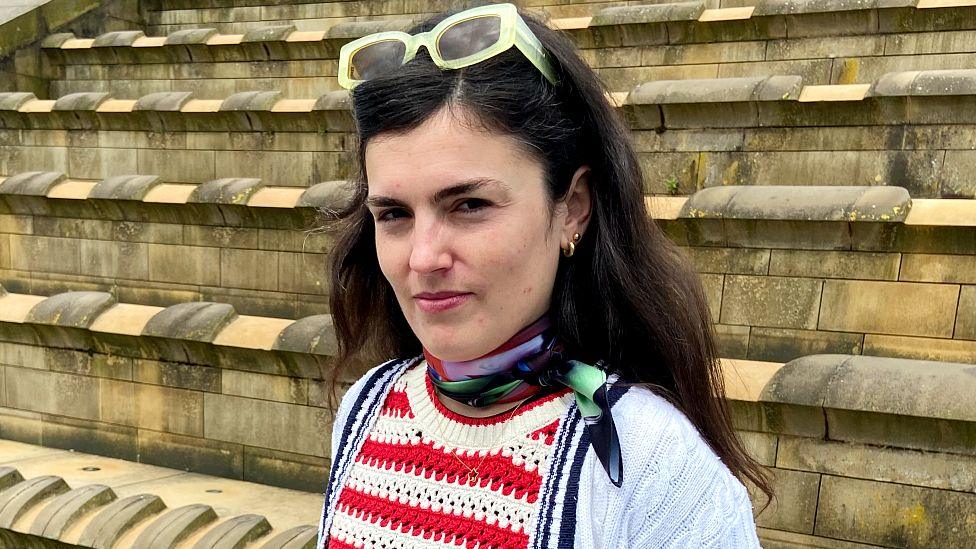
- Published13 June 2024
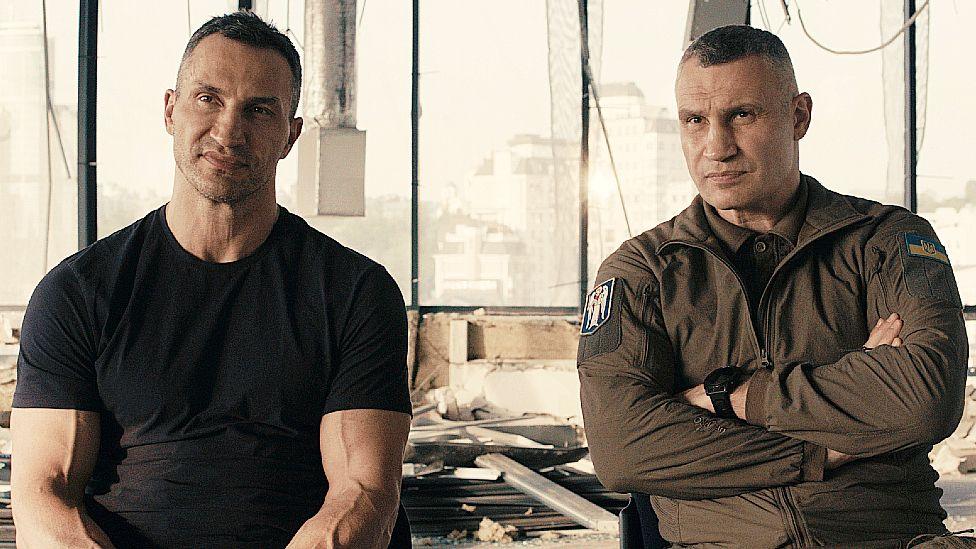
- Published18 November 2024
